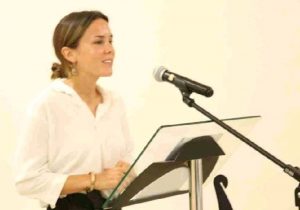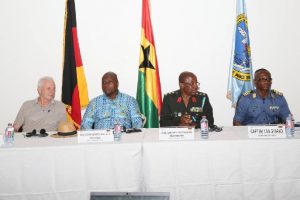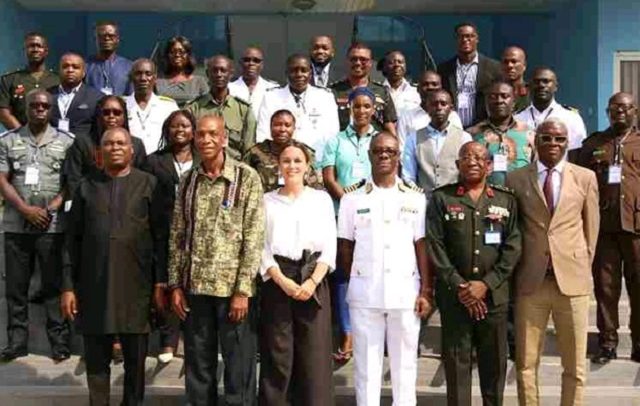Staff of KAIPTC, participants and some facilitators of the course
A training course on maritime security and transnational organised crime has ended in Accra with a call on participants to collaborate with relevant stakeholders to help fight transnational organised crimes within the African sub-region.
The course, which started on November 3 and ended on November 17, was organised by the Kofi Annan International Peace Keeping Training Centre (KAIPTC) with sponsorship support from the German government, and was aimed to enhance the knowledge base of state and non-state actors with skills and latest information in dealing with maritime crime in the Gulf of Guinea, among others.
Pauline Okkens, Political Advisor at the German Embassy, in her remarks, said the fight against transnational organised crimes such as human trafficking, illegal fishing, drug trafficking, smuggling of arms and light weapons among others could be effectively addressed through coordinated collaboration among coastal states and maritime bodies.

She said the training was in line with the German government’s objective of supporting state and non-state actors from the Economic Community of West African States (ECOWAS) and African Union (AU) who have over the years shown commitment in the fight against maritime insecurity and organised crimes.
Twenty (20) participants were selected from various sectors both in Ghana and other West African countries including the Military, Prisons Service, Immigration Service, Narcotics Control Commission, Fisheries Commission, and Civil Society Organisations (CSOs) in the maritime industry as well as representatives of some media organisations, including the DAILY GUIDE.
Some of the courses undertaken by the participants during the 10-day course include illegal migration by sea, money laundering, drug trafficking, legal frame work on maritime security, maritime terrorism, piracy and armed robbery at sea among others.

Deputy Commandant at the KAIPTC, Air Commodore David Annetey Akrong, in his closing remarks at the end of the course, said transnational organised crime requires concerted efforts and persistent inter-state and intra-state collaboration among nations and regions to deal with it.
He said the course which offered security personnel, civilian experts and industry players an overview of new developments in the maritime space will not only enhance the knowledge base of participants but will also go a long way to improve coordination, collaboration as well as exchange of information among stakeholders in the maritime sector.
He said, “It is apparent that your knowledge has increased and that you are now more familiar with the most recent maritime security legislative frameworks as well as the ECOWAS Maritime Security Architecture for fighting crime. For now, the best course of action is to fortify the networks established on the course. Consult, share information, and support the endeavours of each other.”
Participants who could not hide their joy at the end of the course told a representative of the DAILY GUIDE, who was also part of the course, that it was a fulfilled moment worth recommending to other stakeholders, especially field visit to some maritime operation centres, sea visits and scenario based exercises led by Captain Yaw Gyarko and Air Commodore Addison (Rtd), which were embedded in the course.
By Ebenezer K. Amponsah


